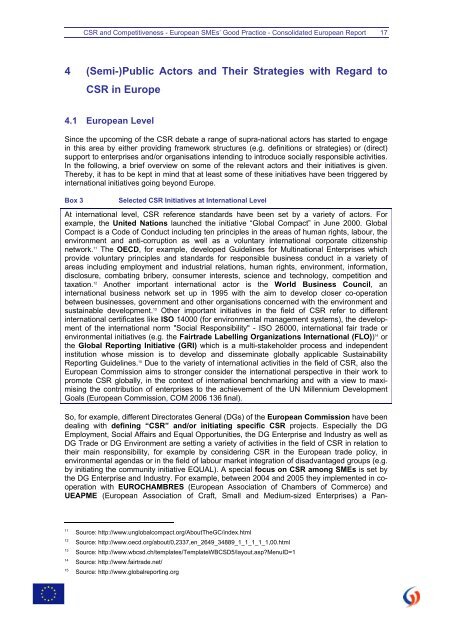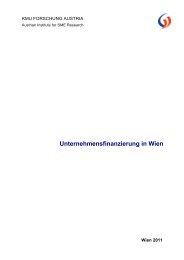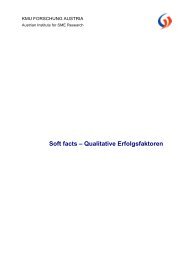CSR and Competitiveness European SMEs - KMU Forschung Austria
CSR and Competitiveness European SMEs - KMU Forschung Austria
CSR and Competitiveness European SMEs - KMU Forschung Austria
Create successful ePaper yourself
Turn your PDF publications into a flip-book with our unique Google optimized e-Paper software.
<strong>CSR</strong> <strong>and</strong> <strong>Competitiveness</strong> - <strong>European</strong> <strong>SMEs</strong>’ Good Practice - Consolidated <strong>European</strong> Report 17<br />
4 (Semi-)Public Actors <strong>and</strong> Their Strategies with Regard to<br />
<strong>CSR</strong> in Europe<br />
4.1 <strong>European</strong> Level<br />
Since the upcoming of the <strong>CSR</strong> debate a range of supra-national actors has started to engage<br />
in this area by either providing framework structures (e.g. definitions or strategies) or (direct)<br />
support to enterprises <strong>and</strong>/or organisations intending to introduce socially responsible activities.<br />
In the following, a brief overview on some of the relevant actors <strong>and</strong> their initiatives is given.<br />
Thereby, it has to be kept in mind that at least some of these initiatives have been triggered by<br />
international initiatives going beyond Europe.<br />
Box 3 Selected <strong>CSR</strong> Initiatives at International Level<br />
At international level, <strong>CSR</strong> reference st<strong>and</strong>ards have been set by a variety of actors. For<br />
example, the United Nations launched the initiative “Global Compact” in June 2000. Global<br />
Compact is a Code of Conduct including ten principles in the areas of human rights, labour, the<br />
environment <strong>and</strong> anti-corruption as well as a voluntary international corporate citizenship<br />
network. 11 The OECD, for example, developed Guidelines for Multinational Enterprises which<br />
provide voluntary principles <strong>and</strong> st<strong>and</strong>ards for responsible business conduct in a variety of<br />
areas including employment <strong>and</strong> industrial relations, human rights, environment, information,<br />
disclosure, combating bribery, consumer interests, science <strong>and</strong> technology, competition <strong>and</strong><br />
taxation. 12 Another important international actor is the World Business Council, an<br />
international business network set up in 1995 with the aim to develop closer co-operation<br />
between businesses, government <strong>and</strong> other organisations concerned with the environment <strong>and</strong><br />
sustainable development. 13 Other important initiatives in the field of <strong>CSR</strong> refer to different<br />
international certificates like ISO 14000 (for environmental management systems), the development<br />
of the international norm "Social Responsibility" - ISO 26000, international fair trade or<br />
environmental initiatives (e.g. the Fairtrade Labelling Organizations International (FLO)) 14 or<br />
the Global Reporting Initiative (GRI) which is a multi-stakeholder process <strong>and</strong> independent<br />
institution whose mission is to develop <strong>and</strong> disseminate globally applicable Sustainability<br />
Reporting Guidelines. 15 Due to the variety of international activities in the field of <strong>CSR</strong>, also the<br />
<strong>European</strong> Commission aims to stronger consider the international perspective in their work to<br />
promote <strong>CSR</strong> globally, in the context of international benchmarking <strong>and</strong> with a view to maximising<br />
the contribution of enterprises to the achievement of the UN Millennium Development<br />
Goals (<strong>European</strong> Commission, COM 2006 136 final).<br />
So, for example, different Directorates General (DGs) of the <strong>European</strong> Commission have been<br />
dealing with defining “<strong>CSR</strong>” <strong>and</strong>/or initiating specific <strong>CSR</strong> projects. Especially the DG<br />
Employment, Social Affairs <strong>and</strong> Equal Opportunities, the DG Enterprise <strong>and</strong> Industry as well as<br />
DG Trade or DG Environment are setting a variety of activities in the field of <strong>CSR</strong> in relation to<br />
their main responsibility, for example by considering <strong>CSR</strong> in the <strong>European</strong> trade policy, in<br />
environmental agendas or in the field of labour market integration of disadvantaged groups (e.g.<br />
by initiating the community initiative EQUAL). A special focus on <strong>CSR</strong> among <strong>SMEs</strong> is set by<br />
the DG Enterprise <strong>and</strong> Industry. For example, between 2004 <strong>and</strong> 2005 they implemented in cooperation<br />
with EUROCHAMBRES (<strong>European</strong> Association of Chambers of Commerce) <strong>and</strong><br />
UEAPME (<strong>European</strong> Association of Craft, Small <strong>and</strong> Medium-sized Enterprises) a Pan-<br />
11 Source: http://www.unglobalcompact.org/AboutTheGC/index.html<br />
12 Source: http://www.oecd.org/about/0,2337,en_2649_34889_1_1_1_1_1,00.html<br />
13 Source: http://www.wbcsd.ch/templates/TemplateWBCSD5/layout.asp?MenuID=1<br />
14 Source: http://www.fairtrade.net/<br />
15 Source: http://www.globalreporting.org




